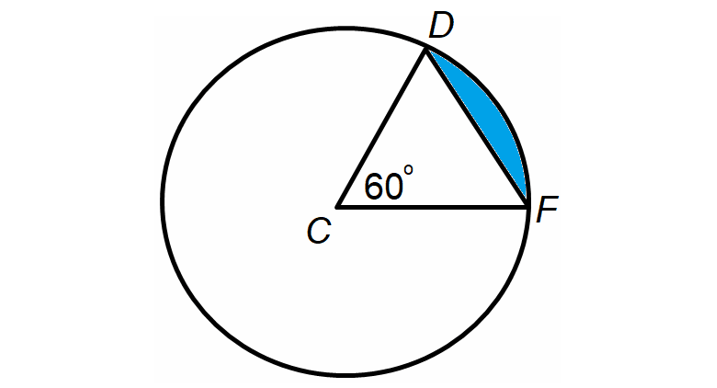RELATION BETWEEN GCD AND LCM OF POLYNOMIALS PRACTICE QUESTIONS
Find the LCM of each pair of the following polynomials
1) x2 - 5x + 6, x2 + 4x - 12 whose GCD is (x - 2)
2) x4 + 3x3 + 6x2 + 5x + 3, x4 + 2x2 + x + 2 whose GCD is x2 + x + 1
3) 2x3 + 15x2 + 2x - 35, x4 + 8x2 + 4x - 21 whose GCD is x + 7
4) 2x3 - 3x2 - 9x + 5, 2x4 - x3 - 10x2 - 11x + 8 whose GCD is 2x - 1
Find the other polynomial q(x) of each of the following, given that LCM and GCD and one polynomial p(x) respectively.
5) (x + 1)2 (x + 2)2, (x + 1) (x + 2), (x + 1)2 (x + 2)
6) (4x + 5)3 (3x - 7)3, (4x + 5) (3x - 7)2, (4x + 5)3 (3x -7 )2
7) (x4 - y4)(x4 + x2y2 + y4), x2 - y2, x4 - y4 Solution
8) (x3 - 4x) (5x + 1), (5x2 + x), (5x3 - 9x2 - 2x) Solution
9) 2(x + 1) (x2 - 4), (x + 1), (x + 1) (x - 2) Solution
10) (x - 1) (x - 2) (x2 -3x + 3), (x - 1), (x3 - 4x2 + 6x - 3)
11) 2(x + 1) (x2 - 4), (x + 1), (x + 1) (x - 2) Solution
Detailed Solution
1) Solution :
LCM ⋅ GCD = f(x) ⋅ g(x)
LCM = [f(x) ⋅ g(x)]/GCD
f(x) = x2 - 5x + 6
g(x) = x2 + 4x - 12
GCD = (x - 2)
x2 - 5x + 6 = (x - 2 )(x - 3)
x2 + 4x - 12 = (x + 6)(x - 2)
LCM = (x - 2)(x - 3)(x + 6)(x - 2)/(x - 2)
By canceling common factors, we get
LCM = (x - 2) (x - 3) (x + 6)
So, the required LCM is (x - 2) (x - 3) (x + 6).
2) Solution :
x4 + 3x3 + 6x2 + 5x + 3, x4 + 2x2 + x + 2 whose GCD is x2 + x +1
LCM = [f(x) ⋅ g(x)]/GCD
f(x) = x4 + 3x3 + 6x2 + 5x + 3
g(x) = x4 + 2x2 + x + 2
GCD = x2 + x + 1
LCM = [(x4 + 3x3 + 6x2 + 5x + 3) (x4 + 2x2 + x + 2) ]/(x2 + x + 1)
To simplify this, we have to use long division.
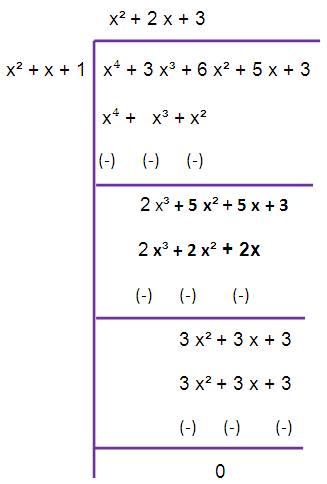
LCM = (x2 + 2x + 3) (x4 + 2x2 + x + 2)
So, the required LCM is (x2 + 2x + 3) (x4 + 2x2 + x + 2).
3) Solution :
2x3 + 15x2 + 2x - 35, x4 + 8x2 + 4x - 21 whose GCD is x + 7
LCM = [f(x) ⋅ g(x)]/GCD
f(x) = 2x3 + 15x2 + 2x - 35
g(x) = x4 + 8x2 + 4x - 21
GCD = x + 7
LCM = [(2x3 + 15x2 + 2x - 35) (x4 + 8x2 + 4x - 21)]/(x + 7)
To simplify this we have to use long division.
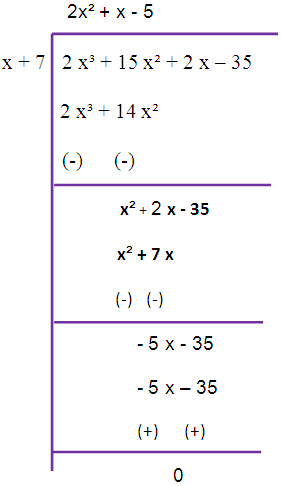
LCM = (2x2 + x - 5) (x4 + 8x2 + 4x - 21)
So, the required LCM is (2x2 + x - 5) (x4 + 8x2 + 4x - 21).
4) Solution :
2x3 - 3x2 - 9x + 5, 2x4 - x3 - 10x2 - 11x + 8 whose GCD is 2x - 1
LCM = [f(x) ⋅ g(x)]/GCD
f(x) = 2x3 - 3x2 - 9x + 5
g(x) = 2x4 - x3 - 10x2 - 11x + 8
GCD = 2x - 1
LCM = [(2x3 - 3x2 - 9x + 5) (2x4 - x3 - 10x2 - 11x + 8)]/(2x - 1)
To simplify this we have to use long division.
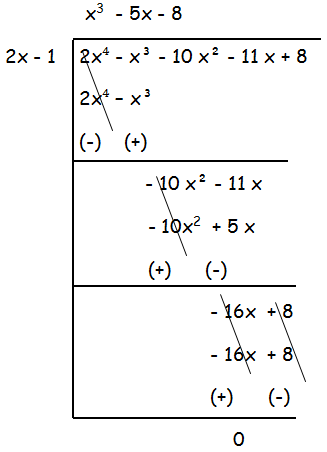
LCM = (x3 - 5x - 8) (2x3 - 3x2 - 9x + 5)
So, the LCM is (x3 - 5x - 8) (2x3 - 3x2 - 9x + 5).
5) Solution :
(x + 1)2 (x + 2)2, (x + 1) (x + 2), (x + 1)2 (x + 2)
LCM ⋅ GCD = p(x) ⋅ q(x)
L.C.M = (x+1)2 (x+2)2
GCD = (x+1) (x+2)
p(x) = (x+1)2 (x+2)
q(x) = [LCM ⋅ GCD]/p(x)
q(x) = [(x+1)2(x+2)2 (x+1) (x+2)]/(x+1)2 (x+2)
q(x) = (x+2)2 (x+1)
So, the other polynomial is (x+2)2 (x+1).
6) Solution :
(4x+5)3 (3x-7)3, (4x+5) (3x-7)2, (4x+5)3 (3x-7)2
LCM ⋅ GCD = p(x) ⋅ q(x)
LCM = (4x+5)3 (3x-7)3
GCD = (4x+5) (3x-7)2
p(x) = (4x+5)3 (3x-7)2
q(x) = [LCM ⋅ GCD]/p(x)
q(x) = [(4x+5)3 (3x-7)3(4x+5) (3x-7)2]/(4x+5)3 (3x-7)2
q(x) = (3x-7)3 (4x+5)
7) Solution :
(x4-y4)(x4+x2y2+y4), x2-y2, x4-y4
LCM ⋅ GCD = p(x) ⋅ q(x)
LCM = (x4-y4)(x4+x2y2+y4)
GCD = x2-y2
p(x) = x4-y4
q(x) = [LCM ⋅ GCD]/p(x)
q(x) = [(x4-y4)(x4+x2y2+y4)(x2-y2)]/(x4-y4)
q(x) = (x4+x2y2+y4)(x2-y2)
So, the other polynomial is (x4+x2y2+y4)(x2-y2).
8) Solution :
(x3-4x) (5x+1), (5x2+x), (5x3-9x2-2x)
LCM ⋅ GCD = p(x) ⋅ q(x)
LCM = (x3-4x) (5x+1)
GCD = 5x2+x = x(5x+1)
p(x) = 5x3-9x2-2x ==> x(5x2-9x-2)
x(5x2-9x-2) ==> x (5x+1)(x-2)
q(x) = [LCM ⋅ GCD]/p(x)
q(x) = [(x3-4x) (5x+1)(5x+1)]/[x (5x+1)(x-2)]
q(x) = [(x2-4)(5x+1)]/(x-2)
q(x) = [(x+2)(x-2)(5x+1)]/(x-2)
q(x) = (x+2)(5x+1)
So, the other polynomial is (x+2)(5x+1).
9) Solution :
(x-1) (x-2) (x2-3x+3), (x-1), (x3-4x2+6x-3)
LCM ⋅ GCD = p(x) ⋅ q(x)
LCM = (x-1) (x-2) (x2-3x+3)
GCD = (x-1)
p(x) = x3-4x2+6x-3
q(x) = [LCM ⋅ GCD]/p(x)
= [(x-1)(x-2)(x2-3x+3)(x-1)]/(x3-4x2+6x-3)
let us use synthetic division to find factors of the cubic polynomial.
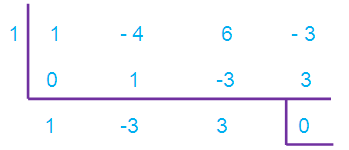
= [(x-1)(x-2) (x2-3x+3)(x-1)]/(x-1) (x2-3x+3)
= (x-2)(x-1)
So, the other polynomial is (x-2)(x-1).
10) Solution :
2(x+1) (x2-4), (x+1), (x+1) (x-2)
LCM ⋅ GCD = p(x) ⋅ q(x)
LCM = 2(x+1) (x2-4)
GCD = (x+1)
p(x) = (x+1) (x-2)
q(x) = [LCM ⋅ GCD]/p(x)
q(x) = [2(x+1) (x2-4)(x+1)]/(x+1) (x-2)
q(x) = [2(x+1) (x+2) (x-2) (x+1)]/(x+1) (x-2)
q(x) = 2(x+1) (x+2)
So, the other polynomial is 2(x+1) (x+2).
Kindly mail your feedback to v4formath@gmail.com
We always appreciate your feedback.
©All rights reserved. onlinemath4all.com
Recent Articles
-
Digital SAT Math : Factoring with Difference of Two Squares
Sep 03, 25 12:30 PM
Digital SAT Math : How to factor and simplify expressions using difference of two squares -
Digital SAT Math Problems and Solutions (Part - 271)
Aug 31, 25 07:25 AM
Digital SAT Math Problems and Solutions (Part - 271) -
Digital SAT Math Problems and Solutions (part - 270)
Aug 30, 25 04:19 AM
Digital SAT Math Problems and Solutions (part - 270)
